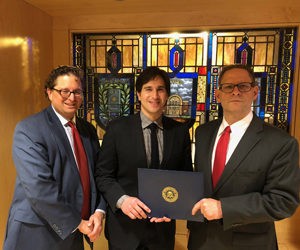At shortly after 10 a.m. last January 18, the Sabes JCC got its call, (a month before the St. Paul JCC got its call) and it has me wondering: have we learned anything from the experience?
I think we have. Why? Because what we saw, if you look past the angst, discomfort, and generally ickiness this whole thing caused (including the fact that the perpetrator is Jewish), was that the community pulled together.
Those of us in those buildings on those days got out fast – and there were a lot of us. Between ECC kids at both buildings, the Heilicher Minneapolis Jewish Day School kids at Sabes and the fact kids at St. Paul for non-school-day childcare for President’s Day, plus the seniors, inclusion program participants and fitness center users, it made for a lot of people to get cleared out. It went seamlessly (to the untrained eye, at least), because the community was ready.
“From our perspective, it highlighted what had been in-progress,” said Steve Hunegs, the executive director of the Jewish Community Relations Council of Minnesota and the Dakotas. “It had been on-going for a number of years. Through a series of JCC bomb threats and other activities nationwide have continued to focus people’s thoughts on security.”

Steve Hunegs and Anthony Sussman of the JCRC with Richard Thornton, the special agent in charge of the FBI Minneapolis office.
The JCRC has always worked closely with local, state and federal law enforcement to help develop plans – which doesn’t come as any surprise. Yesterday, the FBI honored the JCRC with the Director’s Community Leadership Award, which was established in 1990 by the FBI to publically recognize the achievements of individuals and organizations that have gone above and beyond the call to service by making extraordinary contributions to their communities in the areas of civil rights, terrorism, cyber, drug, gang, or violence prevention and education.
“It’s a reflection of our entire community; where the FBI may give the award to the JCRC, it wouldn’t happen but for the community’s cooperation on security and law enforcement,” Hunegs said. “Each individual institution plays a part. They have always been great collaborators in the work we do. It’s important to underscore as we exist and the crossroads of security and civil rights. One piece is working with those who may have a less trusting relationship. Trying to act as a bridge between those groups and law enforcement.”
The award from the FBI specifically recognized the JCRC’s leadership in the Minneapolis Division’s territory and more than 15 years of partnership. But also cited that in the wake of the threats to the community, ” JCRC demonstrated essential community leadership by organizing community forums to partner with law enforcement, provide education, and to address community concerns.”
“The community response has demonstrated that there is strong cooperation in the community and that various communal agencies work together well,” Hunegs said. “The debrief following the two threats show that there are lessons that have been learned and that we can continue to strengthen our cooperation.”
Hunegs said that local agencies have upped their game as well when it comes to security.
“Agencies have done a remarkable job of simultaneously adding security while still being welcoming,” he said. “It’s incremental. That’s how you experience real growth: We go forward, we learn, we get stronger.”
As a child of the 80s, I fell in that spot in between existential threats: We didn’t have the duck-and-cover drills my parents had in school in the face of a nuclear threat from the Soviet Union, or the more terrifying (as a parent) lockdown/active shooter drills that kids today. The threats of last year are just one more thing that our kids have to prepare for in the schools and community centers. But what I watched last year – and see every day in ways big and small – was communities that pulled together, protected its own, and helped us move forward.

